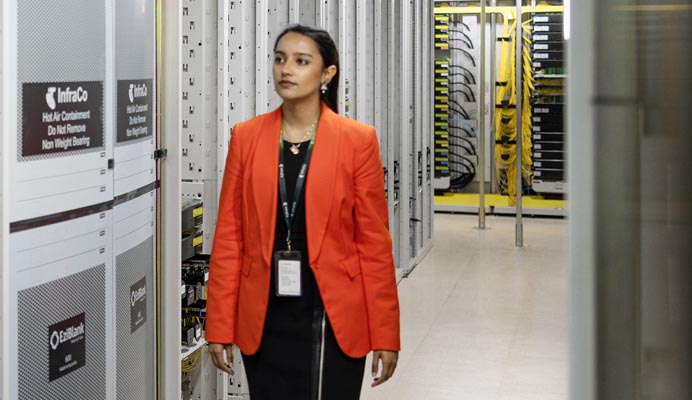Environment
Working smarter to improve energy efficiency

Our sustainability program in numbers
Absolute emissions
We aim to reduce absolute emissions from FY19 by at least 70% reduction for scope 1 & 2 emissions by 2030.
Network Waste Recycling
We aim to increase our Network Waste Recycling Rate to 90% by 2025.
Renewable energy
We’re enabling renewable energy generation equivalent to 100% of our consumption by 2025.* Refer to disclaimer at end of content.
Energy reduction
Telstra InfraCo's network sites, including fixed network sites and data centres are our largest consumers of electricity. We continue to invest in energy reduction projects.
Energy and emissions management
The amount of energy consumed by our assets is a major influencer of the size of our carbon footprint and our teams work hard to plan, design, build, operate, maintain and remove these assets in the most energy efficient way.
We’re exploring more energy-efficient operations
Reducing our energy use involves improving the efficiency of our fixed network sites, data centres and infrastructure.
Operating our infrastructure requires a lot of electricity. In an interconnected energy grid, investments in renewable energy generation help to decarbonise the grid for everyone. By 2025, Telstra’s target is to enable renewable energy generation equivalent to 100% of our consumption including the energy consumed by Telstra InfraCo.
Read about our energy-saving initiatives in Our Bigger Picture Sustainability Report 2024 (PDF, 4MB).
Energy reduction initiatives
We’re investing in energy efficiency, exploring new technologies and building climate change considerations into business planning.
Fixed network sites
LED lighting
Since 2020, we have removed 127,760 fluorescent lights and replaced them with 64,630 new LED fittings. Recycling redundant fluorescent tubes, batteries from emergency fittings and metal and plastic from the old light fittings is a key element of this initiative. The new lights were delivered without plastic packaging.
HVAC optimisation
Physical inspections of our network sites identify faults affecting power consumption, while equipment performance reviews reveal optimisation opportunities.
Energy efficiency upgrades
Our capital works program includes the installation of fresh air-cooling systems, high efficiency air-conditioners, cooling control, chilled water optimisation systems and retrofitting electronically commutated fans.
Upgrading rectifiers
Rectifiers convert electricity from AC to DC power, required to run our telecommunications equipment. We continue to upgrade older units to more modern, high efficiency rectifiers, which are now achieving efficiency levels of 96–98%.
Aura Dark Fibre
Initiative 1
High-performance fibre, which is ~50% lighter.
Initiative 2
Using a 2.4x (240%) longer drum length (~5km to up to 12km) than previous cable drums.
Initiative 3
Implementing two fibre cables to be dual ploughed.
Network recycling initiatives
We are committed to minimising resource usage and waste to landfill. We have set a target to increase our network waste recycling rate to 90% by 2025.
For most of Telstra’s 140-year history, we have used copper to deliver our landlines and connect people across our telecommunications network. We’re currently looking at ways to recycle copper from our network that is no longer required.
13,930 tonnes of metal recycled in FY23
Telstra InfraCo’s copper cable recovery program resulted in 13,930 tonnes of metal being recycled in FY23.
The metals extracted included aluminium, copper and lead, avoiding emissions and waste from mining new metals.
Industry-recognised operations
Telstra InfraCo’s Energy Reduction Program received the 2022 Leading Energy User award at the National Energy Efficiency Conference. This award recognises the innovation, leadership and energy reduction work that happens across Telstra InfraCo.
Connect with us
Find the right team member
Our services include sales, maintenance and partnerships – all of which you can access from our main contact page or enquiry form.
Help protect our network
Minimising damage to infrastructure to maximise the efficiency of essential services and customer safety.

